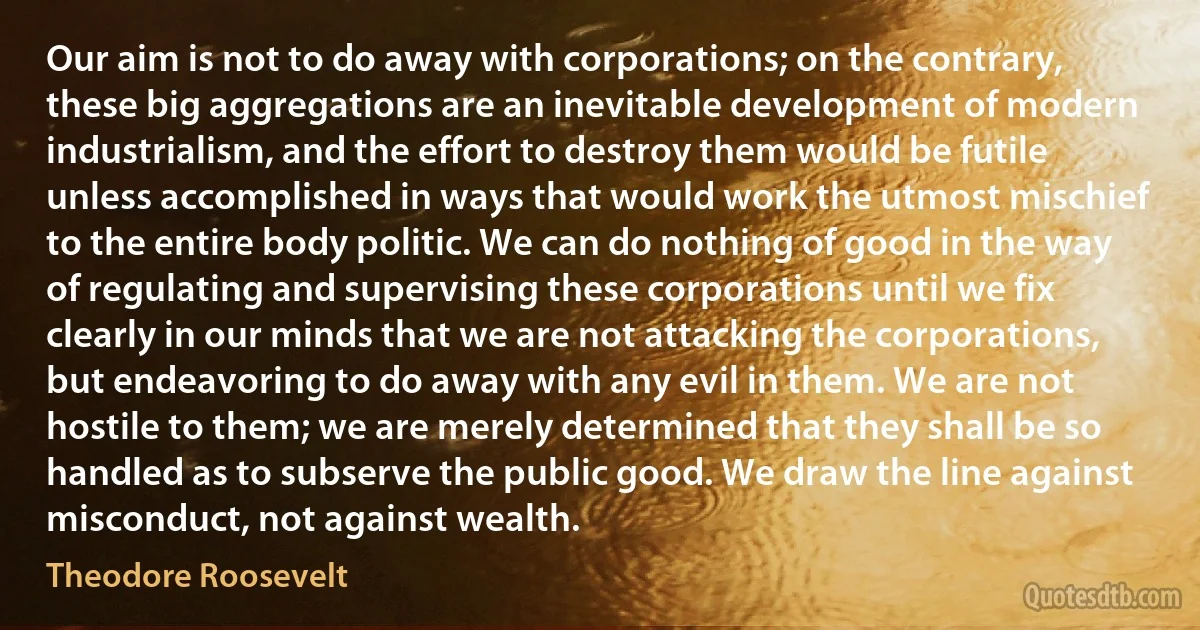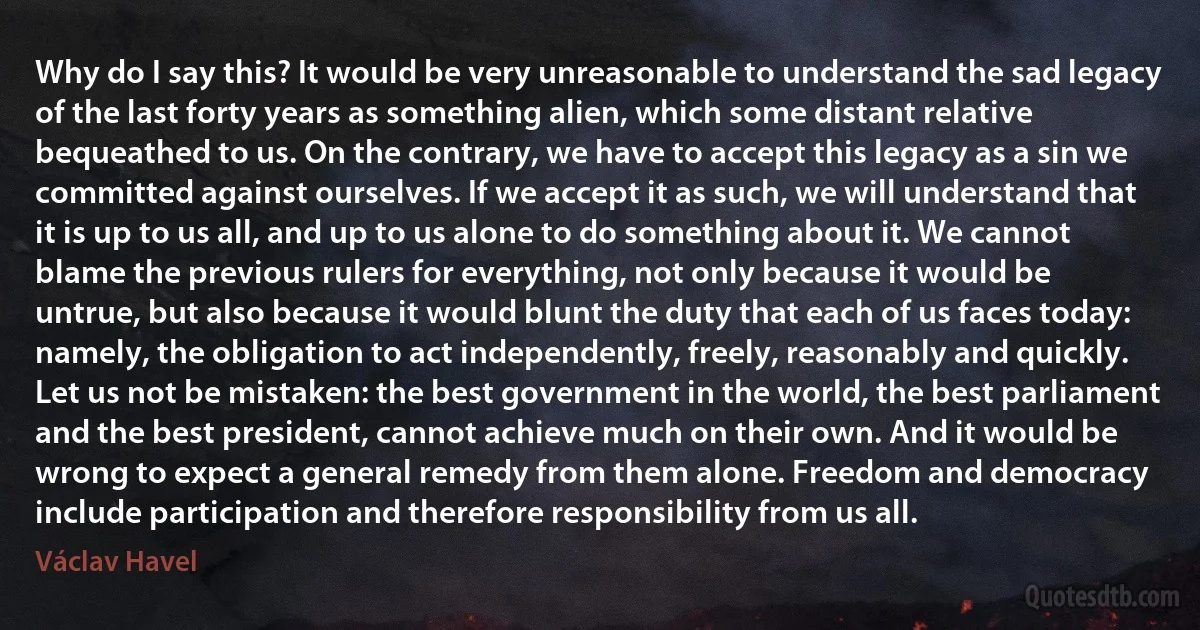Contrary Quotes - page 50
The diminishing standing of public authorities in matters of morality and personal relationships in no way supposed a decline in the role of the state in the cultural affairs of the nation. Quite the contrary. The broad Western European consensus of the age held that only the state had the resources to service the cultural needs of its citizens: left to themselves, individuals and communities would lack both means and initiative. It was the responsibility of a well-run public authority to deliver cultural nourishment no less than food, lodging and employment. In such matters Social and Christian Democrats thought alike, and both were heir to the great Victorian-era improvers, though with far greater resources to hand. The aesthetic revolt of the Sixties changed little in this respect: the new (‘counter-') culture demanded and obtained the same funding as the old.

Tony Judt
Better the absence of greatness than the establishing of a false greatness by assumed humility. Not only do these efforts at humility on man's part not express strength, they are, on the contrary, expressions of modesty born of weakness, which springs from a lack of knowledge of the truth of Reality.
Beware of modesty. Modesty, under the cloak of humility, invariably leads one into the clutches of self-deception. Modesty breeds egoism, and man eventually succumbs to pride through assumed humility.
The greatest greatness and the greatest humility go hand in hand naturally and without effort.

Meher Baba
When Mr. Cobden preached his doctrine he believed, as he had at that time considerable reason to suppose, that while foreign countries would supply us with our foods and raw materials we should remain the workshop of the world and should send them in exchange our manufactures. But that is exactly what we have not done. On the contrary...we are sending less and less of our manufactures to them, and they are sending more and more of their manufactures to us...Our existence as a nation depends upon our manufacturing capacity and production.

Joseph Chamberlain
A principal characteristic of technique ... is its refusal to tolerate moral judgments. It is absolutely independent of them and eliminates them from its domain. Technique never observes the distinction between moral and immoral use. It tends on the contrary, to create a completely independent technical morality.
Here, then, is one of the elements of weakness of this point of view. It does not perceive technique's rigorous autonomy with respect to morals; it does not see that the infusion of some more or less vague sentiment of human welfare cannot alter it. Not even the moral conversion of the technicians could make a difference. At best, they would cease to be good technicians. This attitude supposes further that technique evolves with some end in view, and that this end is human good. Technique is totally irrelevant to this notion and pursues no end, professed or unprofessed.

Jacques Ellul
They [the Government] argue that if the rich are made rich enough, some wealth will spill over to make the poor less poor. There is no sign of that happening. On the contrary, the gap has widened. The number of those below the poverty line and with little hope of rising above it has grown inexorably. Connected divides become deeper and wider-that between the employed and the unemployed, that between the north and south, and that between those who share prosperity and those to whom it looks like a closed fortress. The Budget...does nothing to counteract that. ... If I were the Chancellor, I would be deeply apprehensive for the future cohesion of our society under his policies.

Roy Jenkins
[The third principle of British democracy was that national sovereignty belonged to the people.] We lend it to our representatives to use for five years at a time. ... Any Government or MP pretending to give away these sovereign powers without the explicit consent of the people is acting unconstitutionally. Laws that pretend to take away these powers permanently have no moral authority. ... [Heath's government] will fail because they are trying to act contrary to centuries of British tradition. The people will not have it. But the resistance that is building up is not, in any sense, revolutionary.

Tony Benn
Contrary to popular belief there is no reason whatever to suppose that the remuneration of labour in general has been raised by the combination of labour through the trade unions to a higher level than it would have stood at otherwise. The rising standard of living of the employed population is due to many causes; but restrictive practices are not among them. No doubt in individual occupations combination has from time to time succeeded in raising real wages above what they would have been in its absence; but any such gain, which is invariably at the expense of workers in other employments and of the general public, is always temporary and usually brief. After more or less inconvenience and, in recent times, by dint of more or less inflation, the pattern of real wages reverts to one which corresponds with the balance of supply and demand for labour in the various employments in different parts of the country.

Enoch Powell
The wrong policy is the policy which Germany pursued after 1870. Germany made the Triple Alliance an exclusive Alliance, forced the pace in armaments, and that policy produced conditions in Europe which led to war in 1914. I am convinced that is the true reading of history. Precisely because of that, I think it would be a grave blunder for the Allies who won the last War to repeat the German policy of 1870, and so far they have not done so. On the contrary, they have pursued what seems to me the right policy-the League of Nations policy and Locarno... They have got Germany coming into the League of Nations-on to the Council-on equal terms; they have got Germany to come into the joint security, both for France and Germany, of the Treaty of Locarno. That was the right policy. If the Government was about to go and make a separate political Entente with France it would be a departure from the right policy.

Edward Grey, 1st Viscount Grey of Fallodon
The thing is that religion itself cannot but be dynamic which is why "return" is an incorrect term. A return to the forms of religion which perhaps existed a couple of centuries ago is absolutely impossible. On the contrary, in order to combat modern materialistic mores, as religion must, to fight nihilism and egotism, religion must also develop, must be flexible in its forms, and it must have a correlation with the cultural forms of the epoch. Religion always remains higher than everyday life. In order to make the elevation towards religion easier for people, religion must be able to alter its forms in relation to the consciousness of modern man.

Aleksandr Solzhenitsyn
Yet an official U.S. document from 1959, the Law 86-90, does not include Russia in the list of nations oppressed by communism. On the contrary, "Russian imperialism," not communism, is held responsible for the conquest of some 20 countries--even China, Tibet and some made-up place called "Kazakia." ('Cossackia') - One is amazed that this silly law is still on the books, even today....This was not Russian imperialism, which in the past only expanded its borders somewhat. This was communist imperialism, which aimed to take over the whole world... This is complete delirium! When was Russia ever in Africa? When did Russia ever want to snatch Angola or Cuba? When was she ever in Latin America? The historical Russia has never tried to take over the world, whereas the communists had precisely this aim...

Aleksandr Solzhenitsyn
In the interests of refuting such chaotic concepts as those which see a divine Church only in a "Church of the saints", an entirely invisible society which is nothing but a pure abstraction, we must not fall into the contrary error. The Church "in so far as visible" is also an abstraction, and our faith should never make separate what God from the beginning has joined together: [...] in ecclesiology just as [...] in Christology, [...] dissociation of the divine and the human [...] is fatal. If necessary, the experience of Protestantism should serve us as sufficient warning. Having stripped it of all its mystical attributes, it acknowledged in the visible Church a mere secular institution; as a matter of course it abandoned it to the patronage of the state and sought a refuge for the spiritual life in an invisible Church, its concept of which had evaporated into an abstract ideal.

Henri de Lubac
Is it not quite possible that the farmers and the promoters of the great mining and manufacturing enterprises which have recently been established in the South may yet find that the free ballot of the workingman, without distinction of race, is needed for their defense as well as for his own? I do not doubt that if those men in the South who now accept the tariff views of Clay and the constitutional expositions of Webster would courageously avow and defend their real convictions they would not find it difficult, by friendly instruction and cooperation, to make the black man their efficient and safe ally, not only in establishing correct principles in our national administration, but in preserving for their local communities the benefits of social order and economical and honest government. At least until the good offices of kindness and education have been fairly tried the contrary conclusion can not be plausibly urged.

Benjamin Harrison
The perfection of a thing does not annul its existence, but, on the contrary, asserts it. Imperfection, on the other hand, does annul it ; therefore we cannot be more certain of the existence of anything, than of the existence of a being absolutely infinite or perfect-that is, of God. For inasmuch as his essence excludes all imperfection, and involves absolute perfection, all cause for doubt concerning his existence is done away, and the utmost certainty on the question is given. This, I think, will be evident to every moderately attentive reader.

Baruch Spinoza
My son is taking a course in philosophy, and last night we were looking at something by Spinoza and there was the most childish reasoning! There were all these attributes, and Substances, and all this meaningless chewing around, and we started to laugh. Now how could we do that? Here's this great Dutch philosopher, and we're laughing at him. It's because there's no excuse for it! In the same period there was Newton, there was Harvey studying the circulation of the blood, there were people with methods of analysis by which progress was being made! You can take every one of Spinoza's propositions, and take the contrary propositions, and look at the world and you can't tell which is right.

Baruch Spinoza
If all that divides Marx from the Classical Economists amounts to the historical character of economic categories, Marx need only historicize these categories, refusing to take them as fixed, absolute or eternal, but, on the contrary, regarding them as relative, provisional and transitory, i.e., as categories subject in the last instance to the moment of their historical existence. In this case, Marx's relation to Smith and Ricardo can be represented as identical with Hegel's relation to classical philosophy. Marx would then be Ricardo set in motion, just as it is possible to describe Hegel as Spinoza set in motion; set in motion, i.e., historicized.

Baruch Spinoza
Spinoza's views on God, religion and society have lost none of their relevance. At a time when Americans seem willing to bargain away their freedoms for security, when politicians talk of banning people of a certain faith from our shores, and when religious zealotry exercises greater influence on matters of law and public policy, Spinoza's philosophy – especially his defence of democracy, liberty, secularity and toleration – has never been more timely. In his distress over the deteriorating political situation in the Dutch Republic, and despite the personal danger he faced, Spinoza did not hesitate to boldly defend the radical Enlightenment values that he, along with many of his compatriots, held dear. In Spinoza we can find inspiration for resistance to oppressive authority and a role model for intellectual opposition to those who, through the encouragement of irrational beliefs and the maintenance of ignorance, try to get citizens to act contrary to their own best interests.

Baruch Spinoza
After it hath been seen how the obstinate and the ignorant of evil disposition are accustomed to dispute, it will further be shewn how disputes are wont to conclude; although others are so wary that without losing their composure, but with a sneer, a smile, a certain discreet malice, that which they have not succeeded in proving by argument - nor indeed can it be understood by themselves - nevertheless by these tricks of courteous disdain they pretend to have proven, endeavouring not only to conceal their own patently obvious ignorance but to cast it on to the back of their adversary. For they dispute not in order to find or even to seek Truth, but for victory, and to appear the more learned and strenuous upholders of a contrary opinion. Such persons should be avoided by all who have not a good breastplate of patience.

Giordano Bruno
Reverence for greatness dies out, and is succeeded by base envy of greatness. Every man is in the way of many, either in the path to popularity or wealth. There is a general feeling of satisfaction when a great statesman is displaced, or a general, who has been for his brief hour the popular idol, is unfortunate and sinks from his high estate. It becomes a misfortune, if not a crime, to be above the popular level.
We should naturally suppose that a nation in distress would take counsel with the wisest of its sons. But, on the contrary, great men seem never so scarce as when they are most needed, and small men never so bold to insist on infesting place, as when mediocrity and incapable pretence and sophomoric greenness, and showy and sprightly incompetency are most dangerous.

Albert Pike



